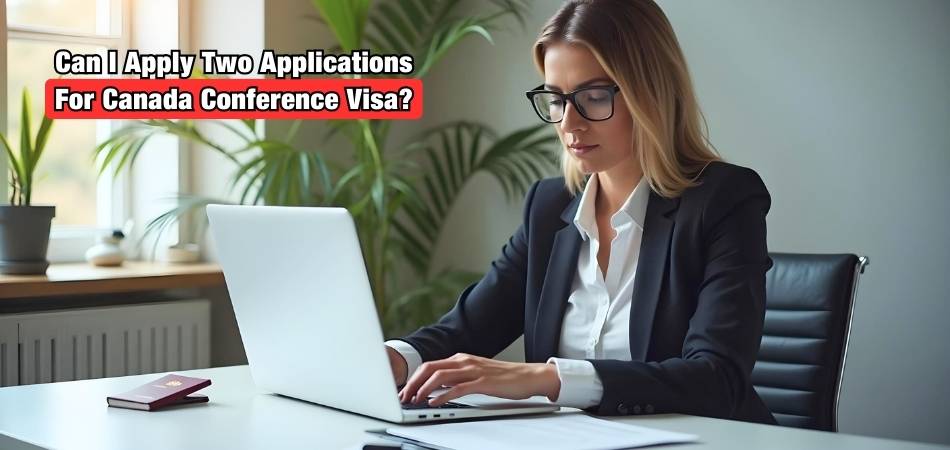In Canada, conferences and events are open to professionals and academics who hold a Canada conference visa. You will need it if you want to network, learn, or present at international events. However, a common question that arises is: Can I apply two applications for Canada conference visa?
Yes, you can apply for two applications for a Canada conference visa, but it is generally not recommended. Submitting multiple applications can complicate the process and may not increase your chances of approval. In fact, it could create confusion or delays in your application process.
The best outcome can be achieved by exploring the process in depth. Continue reading to learn more about how to approach your Canada conference visa application and avoid potential pitfalls.
Who Needs a Canada Conference Visa?
If you’re planning to attend a conference in Canada, you might need a specific type of visa. Being aware of who requires this visa can simplify your travel plans. Here’s a quick overview to help you determine if you need a Canada conference visa:

Business Professionals
Individuals attending business-related conferences in Canada require a conference visa. This visa is crucial for participating in seminars and networking events. It ensures legal entry and participation in professional conferences. Application processes vary, so prepare your documents early.
Academic Participants
Researchers and academics presenting at or attending conferences also need this visa. It facilitates access to scholarly events across Canada. This visa supports the exchange of knowledge and professional growth. Ensure your application is detailed with your academic itinerary.
Government Representatives
Delegates from various governments attending conferences must obtain this visa. It allows them to engage in diplomatic or state-related meetings. Securing a visa is essential for participation in high-level discussions. Start the application process as soon as you receive your invitation.
Trade and Industry Experts
Experts from specific industries visiting Canada for conferences need this visa. They contribute to discussions on trade and industry advancements. Their insights and expertise are valued at specialized conferences. Applying for a visa requires proof of your industry role.
Conference Attendees
All general attendees of conferences in Canada should secure a conference visa. This ensures your stay during the conference is authorized. Applying ahead of time prevents last-minute entry issues. Check the visa requirements specific to your situation.
Can I Apply Two Applications for Canada Conference Visa?
Yes, you can apply for two applications for a Canada conference visa, but it’s not recommended. Doing so may complicate your process rather than improve your chances. Below, we discuss potential problems you might encounter and how to avoid them.
Delays in Processing
Submitting multiple applications can lead to unexpected processing delays. Each submission requires individual attention, which slows down the review process. Immigration officers must cross-check details, further extending the timeline. These delays could impact your ability to attend the conference on time.
Confusion in Records
Having more than one application can create inconsistencies in immigration records. Any discrepancies between the applications might cause concern. As often noted, common causes for Canada visa rejection include such record inconsistencies, which may prompt further investigation. Immigration officials might see this as a red flag requiring additional clarification.
Increased Risk of Rejection
Multiple submissions may raise suspicions about your intent and lead to rejection. Immigration authorities might interpret this as manipulation or over-eagerness. Duplicate or unclear information worsens your chances of approval. A single, well-prepared application avoids these unnecessary risks.
Higher Financial Costs
Every visa application comes with fees that are non-refundable, regardless of the outcome. Submitting two applications doubles your financial burden unnecessarily. These additional costs could be better spent on travel or accommodation. Preparing one strong application is a more cost-effective choice.
Compromised Intent Clarity
Immigration authorities assess your intent based on the information provided. Submitting multiple applications may cloud your purpose for attending the conference. This lack of clarity could work against your approval. A single, thorough application demonstrates clear and honest intent.
Steps to Take When Applying for a Canada Conference Visa
Applying for a Canada conference visa requires careful preparation to ensure a smooth process. Following the correct steps can save time and prevent unnecessary delays. Here’s a detailed guide to help you through each stage of the application:
Step 1: Know the Visa Requirements
Research the specific visa requirements for attending a conference in Canada. These can vary based on your nationality and the purpose of your visit. Ensure you know the documents, forms, and fees required for the application. This clarity will help you gather everything efficiently.
Step 2: Gather Necessary Documents
Compile all essential documents, including your passport, conference invitation, and proof of funds. Additional paperwork, like travel and accommodation details, may also be required. Ensure these documents are accurate, complete, and up-to-date. Missing or incorrect information can delay your application.
Step 3: Complete the Visa Application Form
Fill out the visa application form carefully, avoiding errors and omissions. Use the official Immigration, Refugees, and Citizenship Canada (IRCC) website to access the form. Double-check all entries to ensure accuracy before submission. Mistakes can lead to unnecessary complications or rejection.
Step 4: Pay the Application Fee
Submit the required visa application fee through the approved payment method. Keep a receipt as proof of payment for future reference. Verify the exact fee amount to avoid underpayment or overpayment. This step confirms the processing of your application.
Step 5: Schedule and Attend Biometrics Appointment
If required, schedule a biometrics appointment at a designated center near you. Attend the appointment on time with all necessary documents. Biometrics include fingerprints and photographs to verify your identity. This is an important step for most visa applications.
Step 6: Wait for Processing and Follow Up
After submission, monitor the status of your application online. Processing times can vary, so check regularly for updates. If requested, provide additional information or documents promptly. Staying proactive helps you address any concerns raised during the process.
Things to Do After Applying for a Canada Conference Visa
Applying for a Canada conference visa is just the beginning; there are essential steps to take afterwards to ensure a smooth process. Staying organized and proactive can help you address any unexpected issues. Here are key things to do after submitting your visa application.
- Track Your Application Status: Regularly monitor your application status on the official IRCC website. This ensures you are updated on any progress or requirements.
- Respond Promptly to Requests: If additional information or documents are requested, provide them quickly. Delayed responses can prolong the processing time unnecessarily.
- Prepare for Biometrics Appointment: Confirm your appointment details if biometrics are required. Ensure you have the necessary documents ready for verification at the center.
- Organize Your Travel Documents: Keep your passport, invitation letter, and other essential documents accessible. Having them in order will ease any future verification needs.
- Plan Travel Arrangements in Advance: While waiting, tentatively plan your travel dates and accommodations. Avoid final bookings until your visa is approved.
- Stay Connected with Conference Organizers: Inform the organizers of your visa application status. They may assist with additional documents or confirmations if required.
- Review Travel Health Requirements: Check Canada’s health and vaccination requirements for travelers. Staying informed ensures compliance with any entry regulations upon arrival.
- Keep Backup Copies of Documents: Make photocopies or digital backups of your submitted documents. These copies can be useful if original documents are misplaced.
How to Respond If You’re Rejected for a Visa?
Facing a visa rejection can be discouraging, but you have to stay calm and focus on the steps to take after visa application refusal to resolve the issue. Being aware of the reasons for the refusal will help you plan your next steps effectively. Here are some key actions to improve your chances of success:
Review the Refusal Letter Carefully
Begin by thoroughly reading the refusal letter provided by the immigration authorities. The letter outlines specific reasons for your visa denial. Planning your next application requires understanding these reasons. Misinterpreting the reasons can lead to repeating the same mistakes.
Identify the Main Reason for Rejection
Determine whether the refusal was due to incomplete documentation, unclear intent, or financial insufficiency. Each reason requires a particular response to address the concern. Focus on correcting the identified issue before reapplying. Ignoring the main reason can result in repeated rejection.
Seek Professional Guidance if Needed
Consult an immigration lawyer or visa consultant to analyze your case in detail. Professionals can provide targeted advice based on your situation. Their expertise ensures you don’t overlook crucial details in your next application. A well-informed approach improves your chances of approval.
Gather Additional Supporting Documents
Strengthen your case by collecting additional documentation that addresses the reason for refusal. Clear proof of intent or financial stability may help. Provide well-organized and complete paperwork in your reapplication. Updated and accurate documents can significantly improve your application’s success rate.
Prepare a Detailed Reapplication Plan
Plan your reapplication process carefully, considering the reasons outlined in your refusal. Make necessary adjustments to your application forms and details. Be honest and transparent in explaining how previous issues have been resolved. A clear plan demonstrates your commitment and credibility.
Consider Filing an Appeal if Applicable
If you believe the refusal was unjust, explore the option to appeal the decision. Appeals require strong evidence to support your claim. Learn the specific appeal process for the country issuing the visa. Filing an appeal can show persistence and determination.
FAQs About Can I Apply Two Applications for Canada Conference Visa?
Many questions can arise when applying for a Canada conference visa. From finding out your eligibility to improving your chances of approval, these FAQs address common concerns not covered earlier. Here are some detailed FAQs to guide you through additional aspects of the process:
Can a Family Member Travel with Me on My Conference Visa?
Family members cannot travel under your conference visa and must apply for their visas. Depending on their intent, they may need a visitor visa or other applicable documentation for entry into Canada.
Is an Invitation Letter Mandatory for a Conference Visa?
Yes, an invitation letter is crucial as it validates your reason for visiting Canada. It should include event details, your role, and contact information from the organizers to demonstrate your intent to attend the conference.
Are Digital Conference Invitations Accepted for Visa Applications?
Yes, digital conference invitations are generally accepted, but they should be clear, official, and include all necessary event details. Submitting a well-formatted PDF version adds credibility to your application.
Are There Expedited Processing Options for Conference Visas?
Expedited processing is sometimes available for urgent cases. You must provide valid reasons and supporting documents to request quicker handling of your visa application.
What Happens If I Miss My Biometrics Appointment?
Missing a biometrics appointment may delay your application or result in its rejection. Reschedule as soon as possible and notify the visa office of your inability to attend the original appointment.
Bottom Line
Getting a Canada conference visa is essential for attending professional or academic events in Canada. When considering the question, “Can I apply two applications for Canada conference visa?” it is possible but generally not recommended. Submitting multiple applications can lead to confusion, delays, and even an increased risk of rejection.
A single, well-prepared application is more effective, saving time, money, and effort. To succeed, focus on identifying visa requirements, providing accurate documentation, and following up diligently. Addressing potential concerns proactively ensures your application process is smoother. By taking the right steps and avoiding common pitfalls, you can maximize your chances of approval and enjoy a productive experience at your conference in Canada.







